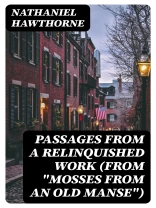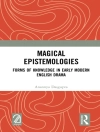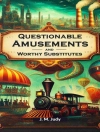In ‘Passages from a Relinquished Work, ‘ Nathaniel Hawthorne offers a poignant glimpse into his creative process and philosophical contemplations. This fragmentary piece, extracted from the broader collection ‘Mosses from an Old Manse, ‘ showcases Hawthorne’s characteristic prose style, blending Romantic sensibilities with deeply introspective and allegorical elements. The work grapples with themes of alienation, the nature of artistry, and the inherent complexity of human existence, reflecting Hawthorne’s engagement with both the personal and the universal. The fragment’s unfinished quality invites readers into the mind of the author, allowing them to explore the juxtaposition of aspiration and limitation in his literary journey. Nathaniel Hawthorne, an emblematic figure of American literature, navigated the tensions of his Puritan heritage while drawing inspiration from the rich traditions of the Transcendentalist movement. His life experiences, including his tumultuous relationship with themes of guilt and moral ambiguity, profoundly influenced his writing. The unfinished nature of this work parallels Hawthorne’s own struggles with expressing his artistic vision amid societal and personal constraints. Readers keen on understanding the nuances of Hawthorne’s literary artistry and philosophical inquiries will find ‘Passages from a Relinquished Work’ particularly illuminating. This text not only enhances the appreciation of his oeuvre but also serves as a meditation on the creative process itself, making it a compelling read for anyone interested in the undercurrents of 19th-century American literature.
Sobre o autor
Nathaniel Hawthorne (1804–1864) was an American novelist and short story writer known for his symbolic and psychological exploration of sin, guilt, and redemption in colonial New England settings. A key figure in the American Romantic movement, Hawthorne’s literary craftsmanship is distinguished by its rich allegory and moral complexity. Born in Salem, Massachusetts, a town marked by the infamy of its 17th-century witch trials, his ancestry and upbringing cast a long shadow over his work. Notably, Hawthorne’s novel, ‘The Scarlet Letter’ (1850), gained widespread acclaim for its profound insight into the rigid Puritanical society and remains a staple in American literature curricula. His book ‘The House of the Seven Gables’ (1851) further cemented his reputation as an astute chronicler of the Puritan legacy and its impact on the American psyche. ‘Passages from a Relinquished Work, ‘ drawn from his collection ‘Mosses from an Old Manse’ (1846), exemplifies Hawthorne’s ability to weave introspective narratives reflective of human experiences. Hawthorne’s literary style is characterized by a somber elegance, merging the gothic with the psychological, often exploring the inner struggles of his characters and the dichotomies of human nature. As a writer, he delved into the themes of sin, punishment, and atonement, perennially addressing the complexities of the human condition. Hawthorne’s work has been extensively analyzed for its contribution to American literature, with scholars recognizing its depth in symbolic interpretation and its influence on later authors. His prose continues to be celebrated for its intricate narratives and moral heft.












